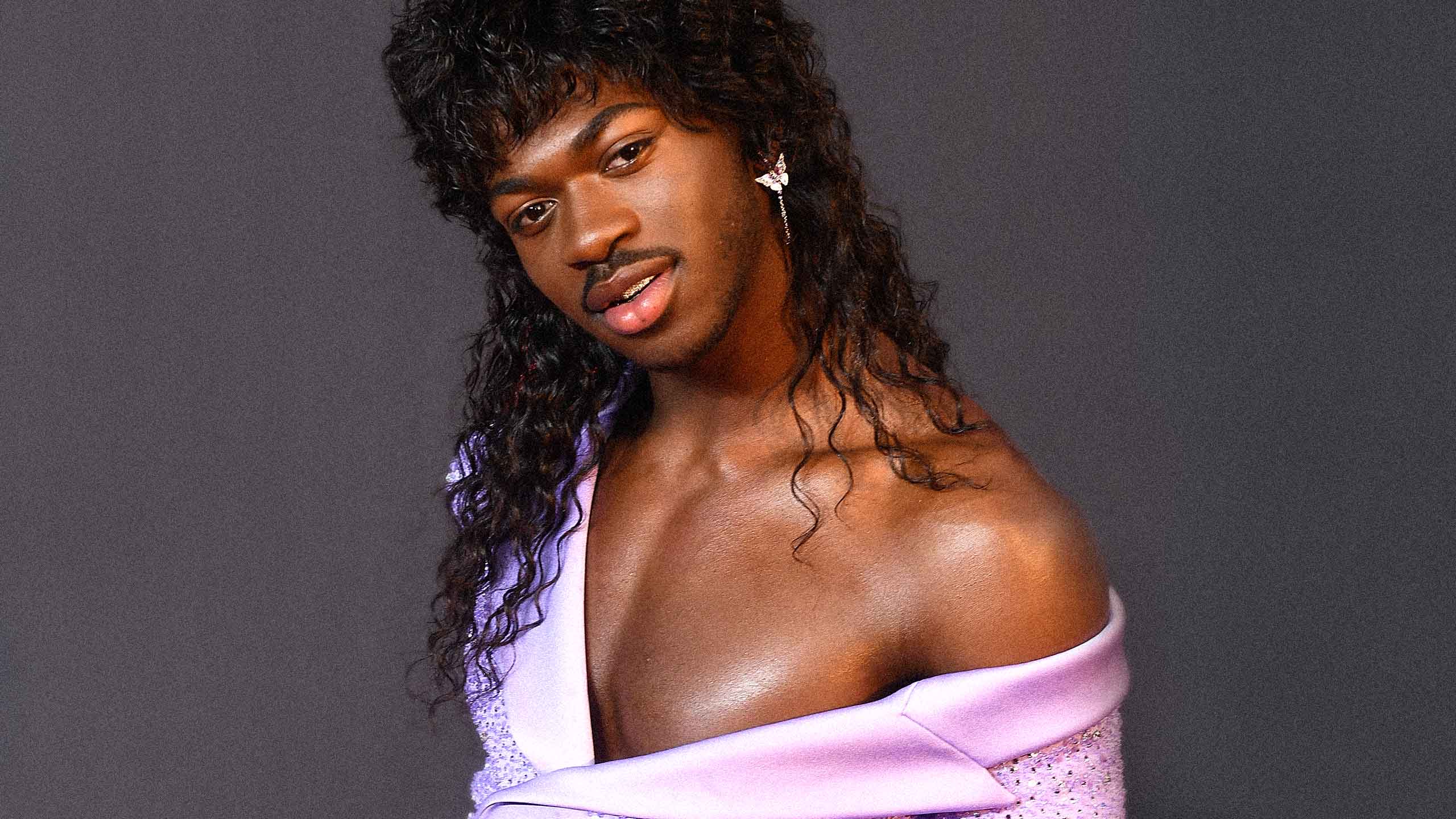Three years after he took us on a whirlwind ride with “Old Town Road,” rapper and rising pop star Lil Nas X finally gave birth to his debut album Montero, and it wouldn’t be a stretch to say junior takes after their father in all the best ways. Executive produced by Take A Daytrip and Omer Fedi, the album is a southern Black gay man’s diary: it features 15 tracks, or journal entries, that document the traumas and desires Lil Nas X has experienced on his journey to confidence over his 22 years of life.
Much focus will be on Montero (the album), a studio debut that allows the artists to (re)introduce themselves in a clear, concise and marketable way. The idea is that one’s first full-length project sets the trajectory of an artist’s career. But in ways large and small, Montero is the antithesis to this notion. Sonically, the album calls back to Lil Nas X’s genre-bending style first teased in his groundbreaking “Old Town Road.” You’ll remember that he sparked debates on what box he should be put in: rap or country. This debut ignores all boundaries, blending hip hop with pop, rock and punk, with a strong emphasis on melodies. Actually, it has a little bit of everything; the album mirrors that unique way Black gay life finds inspiration in every diva, from Janet and Beyoncé to Shania and Kelly (Clarkson).
Admittedly, the album’s sequencing feels a bit off upon first listen, but like most great bodies of work, the replay value is high. What helps the project the most is that, while 15 songs may scream “deluxe album,” it’s just over 40 minutes. Unlike other debuts that have often been bogged down with an unstructured catalogue in the hope of landing on the charts, there’s a new lyric or melody that resonates with each listen of Montero.

Although it’s not quite what many may have expected from the rapper, Montero goes beyond the bounds of traditional hip hop, and is one of the best debuts I’ve experienced in a long time. It marks the true beginning of Lil Nas X. He’s more than an “industry plant,” one-hit wonder or internet troll; he’s Montero Lamar Hill, an unapologetically Black gay man trying to live each day to the fullest. He’s an artist with many inspirations and a wildly expansive imagination. He is the moment.
Below is a track-by-track review of the instant classic that is Montero.
“Montero (Call Me By Your Name)”
The lead single of the album, this track was released back in March to much controversy. The Bible-thumpers and conservatives couldn’t take its religiously-inspired promo material, which included sneakers with blood in them and a music video where Lil Nas X gives Satan a lap dance. The message of the song—which holds multiple meanings—was lost in the outrage. While the religious themes obviously skewer the hypocrisy of Christianity that, on the whole, treats homosexuality as a sin, the actual track is less about the hate the church taught us and more about the love we have to teach ourselves.
Upon release, Lil Nas X dedicated the ingenious anthem to his younger self via an Instagram post: “Dear 14-year-old Montero, I wrote a song with our name in it… I know we promised to never come out publicly, I know we promised to never be ‘that’ type of gay person, I know we promised to die with the secret, but this will open doors for many other queer people to simply exist.”
As an album opener, it does exactly what it needs to by hinting at the out-of-the-box exploration listeners can expect from the rest of the project.
“Dead Right Now”
An instant hit from production to its catchy yet honest lyrics, “Dead Right Now” reflects Lil Nas X’s feelings about the family and friends who didn’t support or believe in him before he made it big. But now that he’s successful, having triumphed over trials and tribulations—some of which those individuals caused—they’ve returned to reap what he’s sowed:
Now they all come around like they been here
When you get this rich and famous, people come up to you singing,
Hallelujah how’d you do it,
You’ve been on my mind, you’ve been running through it, yeah.
Over a spine-chilling, euphoric beat, Lil Nas X also opens up about his complicated (and relatable) relationship with his parents. In the song’s second verse, he details the strain of not having his father’s support when he dropped out of college to pursue a music career: “Left school, then my dad and I had a face-to-face in Atlanta / He said, ‘It’s one in a million chance, son,’ I told him, ‘Daddy, I am that one.’”
The third verse, in which Lil Nas X raps about his mom’s vices, is perhaps the most vulnerable he’s been. In an interview with Zane Lowe, the artist said sharing his mom’s situation was the hardest part because he’s still grappling with it himself.
“Industry Baby”
This boisterous song flips the idea that Lil Nas X is an industry plant, someone backed by a major label that presents themselves as an organic, self-made artist. The third single off the album, it features Jack Harlow, another rapper whose fame may seem like an overnight success. But they came together on this collaboration to set the record straight.
Much has already been said in public conversation about “Industry Baby,” but despite it being the third track on the album, it’s what really sets the tone for Lil Nas X’s Montero era. When he says he’s not just a rapper, but a “pop [star] like Bieber,” he’s putting us on notice. Any read of the album that doesn’t recognize this can’t be trusted. From his choices in production to the inclusion of more singing and the vastness of genres it taps, Lil Nas X is more than just the latest hip-hop fad.
“That’s What I Want”
In “That’s What I Want,” Lil Nas X’s love life is front and centre with this up-tempo track that’s as infectious as Toni Basil’s “Hey Mickey.” Singing about his desire to find “someone to love” and “someone who needs” him, he summarizes the difficulties of dating. And while dating is naturally hard for everyone, the layers of our identities as Black gay men colour our experiences. We have to navigate the narrow confines of how masculinity is often defined, and continuously rebuff the religious indoctrination that says we’re an abomination (on top of things like racism and other forms of homophobia). With one look at a pop culture landscape with limited portrayals of Black gay men loving Black gay men, relationships seems to be endlessly fleeting for many of us. We’re still hopeful, though:
You know it’s harder to find in these times
But I got nothin’ but love on my mind
I need a baby while I’m in my prime
Need an adversary to my down and weary.
“The Art of Realization”
Interludes are making a comeback! This 24 seconds acts as a transition between two sides of Lil Nas X’s desires. It allows him to genuinely acknowledge his doubts about love and the defense mechanisms he uses to cope.
“Scoop,” featuring Doja Cat
“Scoop” focuses on the other side of the coin of “That’s What I Want,” in terms of the ways we sometimes seek companionship through hookups. While Lil Nas X wants to find love, he also understands settling for the next best thing, no matter how superficial. Instead of ignoring his sexual desires, he’s honest about his needs:
Baby, I ain’t tryna be your baby.
Understand, I’m just tryna be the daily …
I don’t want to lie,
I really only need you for the night.
One thing is for sure, this bop gets a cheek or two percolating as soon as the beat drops. Doja’s verse fits perfectly; she glides on the beat as she raps double entendres that may go over most listeners’ heads. My favourite bar is, “He named my right cheek Jennifer and left one Lopez,” a nod to both J.Lo and the late Lisa “Left Eye” Lopes.
“One of Me,” featuring Elton John
A collaboration no one saw coming, Lil Nas X and the iconic Elton John put critics and trolls under the same microscope used to criticize the rapper. He starts off the track quite boldy, pulling from the critiques that have been thrown his way:
Say you one of me,
Say you need the validation
Tell me that you think you won’t top your last creation
Word on the block is you fell off and I’m just sayin’
If it ain’t “Old Town Road,” Lil Nas, you ain’t playing.
In the second verse, he acknowledges not being taken seriously as an artist. He pulls from the comment section of his social media posts, people calling him a meme, gimmick and even wishing for his music career to fail. Ultimately, though, Lil Nas X wants it known that he is not perfect and doesn’t want anyone else to feel like they have to be either.
The collaboration is fitting as artists are told what they should and shouldn’t do by friends, family, fans and even critics (like me). Everyone has an opinion, and for queer people in the public eye, every move is analyzed and questioned as part of the supposed “gay agenda.” Elton John dealt with the same vitriol when he came out as bisexual and then gay during his career. To see him take Lil Nas X under his wing brings a sense of joy because it validates that his artistry is needed so that a new generation has more queer artists to look to.
“Lost in the Citadel”
With “Lost in the Citadel,” Lil Nas X hops into his groovy rock bag as he sings about losing himself in a relationship. He is so infatuated with this person “the universe sent” that he’s blinded by the red flags of a toxic, one-sided relationship—one that his partner knows he can manipulate. But what really speaks to his artistry is the song’s refrain, which turns inward:
Tell me, are you feeling down?
Are you happy, do your dreams still seem inbound?
Tell me, are we finished now?
‘Cause every time you leave, you find a way to come back around.
“Dolla Sign Slime,” featuring Megan Thee Stallion
Montero kicks things up a notch with the braggadocious “Dolla Sign Slime,” featuring the Hot Girl herself, Megan Thee Stallion. This feature is the most exciting on the album, with the two playing off each other well on a track all about confidence and success. Lil Nas X gets pretty cocky out the gate, opening his verse by proclaiming the “album gon’ hit like it’s ’82,” in reference to Michael Jackson’s critically acclaimed album Thriller from that year.
“Tales of Dominica”
The catchy, whimsical ballad “Tales of Dominica,” is a vessel for the sorrow and pressure Lil Nas X feels to succeed. As he mentions in “Dead Right Now,” support from loved ones wasn’t exactly present in his life. On this track, he sings, “Can’t go running back to home / I can’t face her face,” about not wanting the naysayers of his past to be right. The doubts don’t help, though, as he is now out in the real world on his own:
Oh, finally grown, ain’t nothing like I hoped it would be
Out on my own, I’m floating in an oceanless sea
Could I be wrong? Was everybody right about me?
“Sun Goes Down”
The lyrics of “Sun Goes Down” echo from the heart as Lil Nas X sings, “Don’t wanna lie, I don’t want a life / Send me a gun and I’ll see the sun.” A delicate expression of his struggles with depression and suicide, it reveals the human being behind the artist facade, someone working on accepting themself in a world that doesn’t.
The sole verse on the track resonates the most as he raps about being picked on for being Black and gay, and turning to social media to find community amongst strangers. Despite these obstacles, ultimately, he’s happy he finally took a “leap of faith,” a double entendre that refers to his choice to live and to live out loud.
“Void”
“Void” is quite simply beautiful. Another show of vulnerability, it discusses the void he sometimes feels, even at the highest heights of fame and success. A letter of sorts to his “Old Town Road” self, he details the unexpected challenges that he’s faced:
Hello friend from the road,
I wanted to write a note
To let you know that, all in all,
It ain’t all what it seems
I feel like I’ve hit a low
One I’ve never hit before.
The song is soft and intimate and also references his stylist and friend Hodo Musa, who served as the creative director for the album release. The two have become close over the years, and while Lil Nas X may at times feel low, Musa has been a great support system for him to turn to.
“Don’t Want It”
This track is special because it’s the first time Lil Nas X has co-produced, in this case working alongside producer Nick Mira. Lil Nas X delivers us a catchy chorus that interpolates “Hush, Little Baby,” giving new meaning to nursery rhyme raps:
If I say so, know they gon’ ride
I know G’s, and you know they ain’t nice
If I pop up, I’ma want it, but I get by
Tell the devil I can’t have him inside.
Tell the reaper he don’t want it, he don’t want it
Oh, I know everything’s gonna be alright.
As we near the end of the album, “Don’t Want It” is triumphant in spirit. It’s the perfect song to stunt on haters.
“Life after Salem”
Lil Nas X goes entirely left field with “Life after Salem,” but I love every second of it. It’s a punk rock ballad that bears his pain and heartache caused by a lover that’s left him feeling numb. This one is for all the Black kids who grew up loving rock and punk bands like Paramore. The raw emotion on display as the beat puts you in a trance-like state opens the floodgates of intense feelings. Though Lil Nas X rides solo here, I hope a remix is in our near future because Willow Smith would compliment him well.
“Am I Dreaming,” featuring Miley Cyrus
Montero comes to a close with this guitar-heavy track that feels like a warm hug. Featuring Miley Cyrus, a pop star in her own right and daughter of Billy Ray Cyrus, who helped Lil Nas X break records with “Old Town Road,” the song is the perfect epilogue to his debut. Particularly enjoyable for lovers of Disney Channel Original Movies, the track also sonically references The Cheetah Girls’ “Cheetah Sisters.” Its cadence conveys the same feeling of purpose despite the obstacles placed in one’s path.
During her verse, Miley sings, “Glitter comes off, battered in blue, but I gotta go on / As I’m singing, I rewrite my story,” a callback to her career and finding her artistry beyond her Disney persona, Hannah Montana. As far as vocal ability goes, this track captures Lil Nas X’s range as he effortlessly harmonizes with Miley in the chorus.
This story was published with support from Critical Minded.


 Why you can trust Xtra
Why you can trust Xtra


